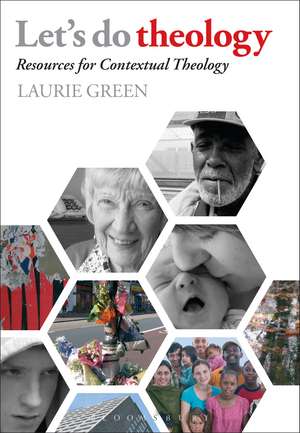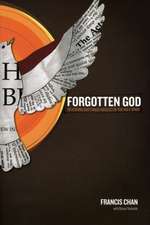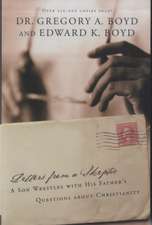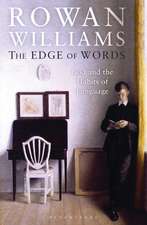Let's Do Theology: Resources for Contextual Theology; completely updated and revised
Autor The Rt Revd Dr Laurie Greenen Limba Engleză Paperback – 11 noi 2009
Preț: 109.26 lei
Preț vechi: 132.88 lei
-18% Nou
Puncte Express: 164
Preț estimativ în valută:
20.91€ • 21.89$ • 17.30£
20.91€ • 21.89$ • 17.30£
Carte disponibilă
Livrare economică 15-29 martie
Livrare express 01-07 martie pentru 49.09 lei
Preluare comenzi: 021 569.72.76
Specificații
ISBN-13: 9780826425515
ISBN-10: 0826425518
Pagini: 208
Ilustrații: 28
Dimensiuni: 169 x 244 x 15 mm
Greutate: 0.38 kg
Ediția:Revised, Update
Editura: Bloomsbury Publishing
Colecția Bloomsbury Continuum
Locul publicării:London, United Kingdom
ISBN-10: 0826425518
Pagini: 208
Ilustrații: 28
Dimensiuni: 169 x 244 x 15 mm
Greutate: 0.38 kg
Ediția:Revised, Update
Editura: Bloomsbury Publishing
Colecția Bloomsbury Continuum
Locul publicării:London, United Kingdom
Caracteristici
It will give readers tried and tested tools to practice contextual theology â?" along with some new thinking.
Notă biografică
Laurie Green studied in London and New York prior to seventeen years in challenging parish ministry. He spent seven years training women and men for ordained ministry before being made Bishop in the Church of England. He has taught around the world and two of his books, including Urban Ministry and the Kingdom of God, have been awarded 'book of the year' status by the Church Times, UK.
Cuprins
Preface PART I: DESCRIBING THE PROCESSChapter 1: Transforming Theology Why do theology?Participating in TheologyLet's Do Theology!Living through exciting times:1. Salvation and the Kingdom of God2. All theology has context3. Theology includes action4. The question of power5. God's concern for the marginalised6. Courageous spiritualityChapter 2: A New Way to Do TheologyDeveloping a methodThe Doing Theology SpiralSome health warningsAn African ExampleA British urban exampleGetting stuckMind the GapPART II: THE FOUR PHASESChapter 3: Starting from ExperienceMaking the experience come alive1. Getting to know the group2. Discerning the Focus3. Sharing First impressions4. Explaining the process5. Getting the best from the group6. The Group7. Personality differences8. The Leadership9. Confidence building10. Tools to encourage the theological processa. Stating the Problemb. Word-associationc. Keeping a recordd. Multi-mediaChapter 4: ExploringFrom Anecdote to analysis Using the analytical tools Gathering analytical informationGathering historical information Gathering geographical information Gathering social information Gathering economic information Discerning the culture Religious factorsThe exploration of ourselves Making sense of the informationLooking for connections Looking for causes Looking for values6. Celebrating the GroupChapter 5: Reflecting1. Challenge from the Christian tradition2. Why do theological reflection?3. The liberation of the imagination4. A selection of set piecesa. Biblical Approaches i. Simple list ii. The checklist iii. Bibliodrama iv. Public enactment v. Bible themes & characters vi. Narrating the Bible vii. Prepared questions viii. Using art materials5. Connecting with other Christian treasures6. Making the connections7. The Baby and the Bathwater8. Checking our intuitions9. Focusing the VisionChapter 6: RespondingFulfilling the Dream Knowing what is to be done Criteria for selectionImportance and viability Who will benefit? Causes not symptoms Who will be involved? Will the response preach the gospel?Aims and Strategies Implementation Dealing with our fears Continuing round the spiralPART III: THINKING IT THROUGHChapter 7: Challenging implications 1. The problem of hermeneutics 2. The question of authority 3. Who should do theology? 4. The People's TheologianChapter 8: Other Styles of TheologisingStyles determined by Role i. Personal Walk with God ii. Me and my Group iii. Me in the Ministry iv. The Church in SocietyStyles determined by Learning Preference i. The living human document ii. Constructing Stories iii. Acting out the Mind of Christ iv. Living the Body of Christ v. Speaking out about God vi. Value-committed Action vii. Theology with a local accentWhere Do I see God? i. Treasure Hunt Theology ii. God on the attack iii. Planting the Gospel iv. God in the Mix v. The Praxis Model 4. Four criticisms 5. A Rule of Life Chapter 9: Spirituality ~ Where will we find God?1. A Rabbinic Storya. Finding God where you areb. Finding God in servanthoodc. Finding God at the edgesd. Finding God in the Issuese. Finding God in repentancef. Finding God in money, sex and power2. Joys and Sorrows in the Spirita. Theology and self-sacrificeb. Celebration with the struggle3. Worship and prayer4. The Practice of Prayer5. Converting the Church6. Church as Privileged Instrument of the KingdomAppendix: A survey of sub-disciplines usually considered to be the content of academic or conventional theologySelected bibliography and contact addresses
Recenzii
...a classic text in contextual theology, and I welcome the publication of this new revised edition. I hope that a whole new generation of Christians will be inspired to move beyond just reading theology to doing it.
I am very pleased because, as a Latin American liberation theologian, I find myself fully agreeing with Bishop Laurie Green's book. It is a book of authentic liberation theology set within the English-speaking context, utilising the same methodology both in theory and practice, in that it takes instances of human experience, analyses them, reflects theologically and proposes practical ideas for transformation. It is a book that invites you to do theology, without disparaging the great tradition. Additionally it provides a good summary of conventional theology and an excellent bibliography. I enthusiastically recommend this significant little book.
So many Christians today yearn to practice a faith that matters, a faith that is rooted in context and in the dream of God, a faith that changes lives and changes the world. Laurie Green answers that cry in this powerhouse of a book. He moves beyond ivory tower God-talk, mines decades of local and global ministry experience, and provides ordinary Christians with the tools to do theology as a way of life. If we're going to become the compassionate, hopeful people of God for a fast-changing, hurting world, we need wise and courageous companions like Green. We need this book.
Now a bishop in the Church of England, Green wrote the first edition in 1989 drawing on his 20 years of ordained ministry in Birmingham and his work with an educational psychologist. Writing for lay readers as well as seminary students, he describes a style of theology that pays close attention to the context. Central to his approach are the four phases of starting from experience, exploring, reflecting, and responding. Other topics include transforming theology, challenging implications, and other styles of theologizing.
A practical book, accessible and direct... a significant resource for all those engaged in leadership and learning, lay and ordained, within the community of faith.
I recommend Green's text for local leaders of faith and communities just beginning their explorations in this vital area of ministry and faith community building.
Theological resources from Scripture onward were never meant to be hoarded. With generous and accessible hospitality Green offers this valuable gem of a book to the whole people of God.
Laurie Green's experience as teacher, pastor and agent for God's change informs every page of this accessible and challenging book ... a new and extensively revised edition which makes full use of developments in theological reflection and cultural understanding in the last two decades, and it retains all its freshness, insight and sheer groundedness in the reality of God's people working for God's Kingdom.
In reading the new edition of Laurie Green's "Let's Do Theology", I had three reactions again and again. I wished I had known about the first edition of this excellent resource over the previous twenty years, because I would have used it in many settings. Every seminarian should engage with this book, so they can bring this clear-minded and warm-hearted approach to theology to their local congregations in the coming generations.
As a Dalit activist theologian I am amazed at Bishop Laurie's wealth of biblical and theological understanding. He challenges the western bias of traditional theology by explaining that every theology is contextual theology. The methodology he adpots helps every reader of this book participate with the author in 'doing' theology. He makes theology 'a tool for the transformation of our own lives and of the society we seek to serve'. This book is a 'must read'.
A tremendously encouraging book - especially for lay people! Ambitious academically and at the same time a challenge for individual and social life in a globalized world. In Laurie Green's book theory and practice are no longer seperated, as theology is brought back into the midst of our life - and things begin to change. Let's hope there will be a German translation soon!
"Accessible theology" might seem like a contradiction. Surely theology is a discipline for the professional specialist. It's not, as Bishop Laurie Green shows us in his marvellous book. Take a look. Theology is how we talk, think and act in relation to God and our neighbour. Its use is not to argue about "hot button" controversies but as a way to make sense of the mundane events of daily life. Bishop Green wants "Theology to become a tool for the transformation of our own lives and of the society we seek to serve." Laurie Green is a teacher and theologian but also a bishop with years of practical experience of pastoral care for thousands of people in city, rural and multi-cultural settings. He has written precisely for this purpose: to assist ordinary Christians find the words and framework to think and speak themselves about God in everyday life. St. Anselm, 11th C. Archbishop of Canterbury wrote about faith seeking understanding and proposed that each of us must explore our faith to the full capacity of our abilities. The First Letter of Peter tells us always to be prepared to give a reason for the hope that lies within us. Read this book. It is simple, direct, practical and wise. And make the connection between the best of our theological heritage and your own daily experience.
I am very pleased because, as a Latin American liberation theologian, I find myself fully agreeing with Bishop Laurie Green's book. It is a book of authentic liberation theology set within the English-speaking context, utilising the same methodology both in theory and practice, in that it takes instances of human experience, analyses them, reflects theologically and proposes practical ideas for transformation. It is a book that invites you to do theology, without disparaging the great tradition. Additionally it provides a good summary of conventional theology and an excellent bibliography. I enthusiastically recommend this significant little book.
So many Christians today yearn to practice a faith that matters, a faith that is rooted in context and in the dream of God, a faith that changes lives and changes the world. Laurie Green answers that cry in this powerhouse of a book. He moves beyond ivory tower God-talk, mines decades of local and global ministry experience, and provides ordinary Christians with the tools to do theology as a way of life. If we're going to become the compassionate, hopeful people of God for a fast-changing, hurting world, we need wise and courageous companions like Green. We need this book.
Now a bishop in the Church of England, Green wrote the first edition in 1989 drawing on his 20 years of ordained ministry in Birmingham and his work with an educational psychologist. Writing for lay readers as well as seminary students, he describes a style of theology that pays close attention to the context. Central to his approach are the four phases of starting from experience, exploring, reflecting, and responding. Other topics include transforming theology, challenging implications, and other styles of theologizing.
A practical book, accessible and direct... a significant resource for all those engaged in leadership and learning, lay and ordained, within the community of faith.
I recommend Green's text for local leaders of faith and communities just beginning their explorations in this vital area of ministry and faith community building.
Theological resources from Scripture onward were never meant to be hoarded. With generous and accessible hospitality Green offers this valuable gem of a book to the whole people of God.
Laurie Green's experience as teacher, pastor and agent for God's change informs every page of this accessible and challenging book ... a new and extensively revised edition which makes full use of developments in theological reflection and cultural understanding in the last two decades, and it retains all its freshness, insight and sheer groundedness in the reality of God's people working for God's Kingdom.
In reading the new edition of Laurie Green's "Let's Do Theology", I had three reactions again and again. I wished I had known about the first edition of this excellent resource over the previous twenty years, because I would have used it in many settings. Every seminarian should engage with this book, so they can bring this clear-minded and warm-hearted approach to theology to their local congregations in the coming generations.
As a Dalit activist theologian I am amazed at Bishop Laurie's wealth of biblical and theological understanding. He challenges the western bias of traditional theology by explaining that every theology is contextual theology. The methodology he adpots helps every reader of this book participate with the author in 'doing' theology. He makes theology 'a tool for the transformation of our own lives and of the society we seek to serve'. This book is a 'must read'.
A tremendously encouraging book - especially for lay people! Ambitious academically and at the same time a challenge for individual and social life in a globalized world. In Laurie Green's book theory and practice are no longer seperated, as theology is brought back into the midst of our life - and things begin to change. Let's hope there will be a German translation soon!
"Accessible theology" might seem like a contradiction. Surely theology is a discipline for the professional specialist. It's not, as Bishop Laurie Green shows us in his marvellous book. Take a look. Theology is how we talk, think and act in relation to God and our neighbour. Its use is not to argue about "hot button" controversies but as a way to make sense of the mundane events of daily life. Bishop Green wants "Theology to become a tool for the transformation of our own lives and of the society we seek to serve." Laurie Green is a teacher and theologian but also a bishop with years of practical experience of pastoral care for thousands of people in city, rural and multi-cultural settings. He has written precisely for this purpose: to assist ordinary Christians find the words and framework to think and speak themselves about God in everyday life. St. Anselm, 11th C. Archbishop of Canterbury wrote about faith seeking understanding and proposed that each of us must explore our faith to the full capacity of our abilities. The First Letter of Peter tells us always to be prepared to give a reason for the hope that lies within us. Read this book. It is simple, direct, practical and wise. And make the connection between the best of our theological heritage and your own daily experience.











